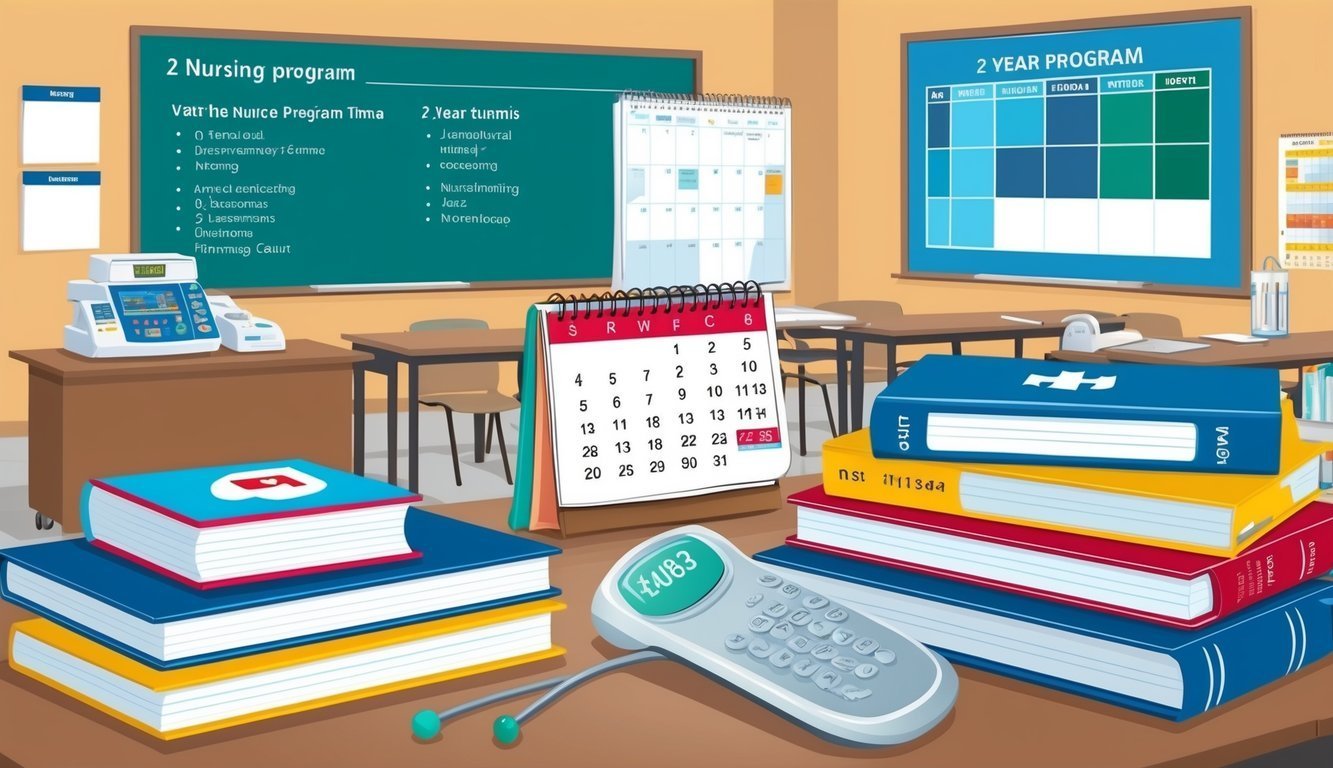Choosing to pursue a career in nursing can be an exciting step toward a fulfilling profession.
For many, trade school provides a direct path into the nursing field.
Depending on the program you choose, trade school for nursing typically takes about 1 to 2 years to complete, allowing you to start your career quickly.
In trade school, you will cover essential nursing skills through both classroom learning and hands-on training.
Programs often lead to an LPN (Licensed Practical Nurse) or other certifications, which prepare you for various healthcare settings.
With the growing demand for healthcare professionals, completing your training can open the door to numerous job opportunities.
Your time in trade school will lay a solid foundation for your future in nursing and can lead to further education and specialization.
You will gain not only the qualifications needed but also a comprehensive understanding of nursing roles in the healthcare system.
Key Takeaways
- Trade school for nursing typically lasts 1 to 2 years.
- Hands-on training is a vital part of the nursing program.
- Completing your training opens doors to various nursing careers.
Understanding the Path to a Nursing Career

Navigating a nursing career involves understanding the various roles available and the educational qualifications needed.
Each nursing position requires specific training and credentials, which can significantly impact your career path.
Exploring Nursing Roles
In the nursing field, several key roles are available, each with distinct responsibilities and requirements:
-
Licensed Practical Nurse (LPN): LPNs provide basic patient care and typically complete their training in about one year through a vocational program. They work under the supervision of RNs and doctors.
-
Registered Nurse (RN): RNs have more responsibilities, often managing patient care and treatment plans. You can become an RN by completing an Associate Degree in Nursing (ADN) in about two years or a Bachelor of Science in Nursing (BSN) in four years.
-
Nurse Practitioner (NP): NPs are advanced practice nurses who can diagnose and treat various health issues. They typically hold a Master’s degree and must be licensed as an RN before pursuing NP training.
-
Certified Nursing Assistant (CNA): CNAs assist with daily patient care tasks and usually complete a short training program, typically lasting 4 to 12 weeks.
These roles offer a range of career opportunities, from entry-level positions to advanced practice roles.
Required Educational Qualifications
The education you need varies based on the nursing role you aspire to.
Here’s a breakdown of typical paths:
| Nursing Role | Education Needed | Duration |
|---|---|---|
| Certified Nursing Assistant | Short training program | 4-12 weeks |
| Licensed Practical Nurse | Vocational program | 1 year |
| Registered Nurse (ADN) | Associate Degree in Nursing | 2 years |
| Registered Nurse (BSN) | Bachelor of Science in Nursing | 4 years |
| Nurse Practitioner | Master’s Degree + RN license | 2-4 years post-BSN |
Each qualification not only opens doors to different job opportunities but also affects your earning potential and career advancement.
For instance, RNs and NPs typically earn higher salaries than LPNs and CNAs due to their advanced training and responsibilities.
Pursuing a nursing career demands careful consideration of your educational choices to align with your career goals.
For more details, visit Nursing Schools.
Types of Nursing Programs

When pursuing a nursing career, you have several types of programs to choose from, each with its own focus and length.
Understanding these options is crucial for making informed decisions about your education and future.
Diploma and Certificate Programs
Diploma and certificate programs offer a fast track into the nursing field, typically lasting about 1-2 years.
These programs often prepare you for initial roles as a Licensed Practical Nurse (LPN) or Certified Nursing Assistant (CNA).
Key points include:
- Focus on practical skills: These programs emphasize hands-on training and clinical experience.
- Quick entry: They allow you to enter the workforce faster than degree programs.
- Career opportunities: Graduates can start working in hospitals, nursing homes, or home healthcare settings.
You can find reliable programs through institutions that focus on practical nursing.
Associate Degree in Nursing (ADN)
An Associate Degree in Nursing (ADN) usually takes 2-3 years to complete.
This degree prepares you for the Registered Nurse (RN) licensing exam and emphasizes fundamental nursing skills.
Advantages include:
- Comprehensive training: You’ll receive instruction in patient care, anatomy, and pharmacology.
- Job readiness: ADN graduates can quickly begin working as RNs in various healthcare settings, including hospitals and clinics.
- Foundation for growth: An ADN can serve as a stepping stone for further education, such as a Bachelor of Science in Nursing (BSN).
Many community colleges and technical schools offer ADN programs, making them accessible.
Bachelor of Science in Nursing (BSN)
A Bachelor of Science in Nursing (BSN) program typically requires 4 years to complete.
This degree offers a more in-depth understanding of nursing and includes coursework in leadership, research, and public health.
Benefits include:
- Advanced training: BSN programs prepare you for higher-level roles and responsibilities in nursing.
- Career advancement: A BSN opens doors to management positions, specializations, and other opportunities.
- Greater earning potential: BSN graduates often earn higher starting salaries than those with an ADN.
Many universities provide BSN programs, some of which offer online or hybrid options to accommodate working students.
Accelerated and Bridge Programs
Accelerated and bridge programs are designed for individuals looking to transition into nursing from a different field or advance their current qualifications.
These programs shorten the time needed to earn your nursing degree.
Key features include:
- Accelerated BSN programs: Typically for those with a bachelor’s degree in another field, these programs can be completed in about 12-18 months.
- RN-to-BSN programs: These are for current RNs who hold an ADN and want to obtain a BSN. They usually take 1-2 years, allowing for career advancement.
- Focused curriculum: Both options provide intensive training to prepare you for the nursing workforce quickly.
Many colleges and universities offer these specialized programs, maximizing your potential in the nursing field.
Practical Components of Nursing Training

Hands-on experience is crucial in nursing training.
It allows you to develop essential clinical skills and prepares you for licensing examinations that validate your proficiency in the field.
Clinical Skills and Hours
In nursing programs, you will engage in various clinical experiences to apply theoretical knowledge in real-world settings.
These hours typically take place in hospitals, clinics, or nursing homes.
During these practical hours, you will learn to manage patient care effectively.
Skills to be developed include:
- Taking Vital Signs: Understanding how to measure and interpret blood pressure, heart rate, and temperature.
- Administering Medications: Gaining competency in the safe handling and delivery of medications.
- Communication: Enhancing your ability to interact with patients and healthcare teams.
Programs often require around 500 to 1,000 clinical hours, depending on whether you aim for an LPN or an RN credential.
For specific program requirements, you can visit Nurse.org.
Licensing Examinations
After finishing your training, you need to pass a licensing examination to start working as a nurse.
For Licensed Practical Nurses (LPNs), this means passing the NCLEX-PN exam.
The NCLEX-PN assesses your knowledge and skills essential for safe and effective nursing care.
The test includes questions on:
- Patient Care: Evaluating your ability to provide essential care.
- Clinical Skills: Testing practical nursing scenarios you encountered during training.
Prepare thoroughly for the examination by reviewing course materials and taking practice tests.
Resources like Nursing World offer valuable study guides to help you succeed.
Advanced Nursing Education and Specializations

Advanced nursing education opens doors to numerous specializations, enhancing your skills and career opportunities.
You can pursue degrees like the Master of Science in Nursing (MSN) or the Doctor of Nursing Practice (DNP), and consider roles such as a Nurse Practitioner (NP) or Certified Registered Nurse Anesthetist (CRNA).
Master of Science in Nursing (MSN)
The Master of Science in Nursing (MSN) is a key step for nurses seeking advanced roles.
Programs typically take 1-2 years to complete after obtaining a Bachelor of Science in Nursing (BSN).
An MSN prepares you for specialized roles, which may include:
- Nurse Educator
- Clinical Nurse Leader
- Nurse Administrator
Many MSN programs offer concentrations, allowing you to focus on areas like pediatrics, gerontology, or mental health.
Graduates can expect higher salaries and increased responsibilities, often leading teams or managing departments.
For more information, visit Nurse.org.
Doctor of Nursing Practice (DNP)
The Doctor of Nursing Practice (DNP) represents one of the highest levels of nursing education.
This degree emphasizes clinical practice and leadership, typically taking 3-5 years to complete post-BSN.
DNP programs cover advanced clinical skills, evidence-based practice, and healthcare policy.
Graduates can work in high-level positions, influencing nursing practice and healthcare systems.
Roles include:
- Nursing Director
- Quality Improvement Manager
- Nurse Executive
A DNP can lead to opportunities for further specialization, enhancing your expertise and earning potential.
Learn more about DNP pathways at NursingWorld.org.
Nurse Practitioner (NP) and Specializations
Becoming a Nurse Practitioner (NP) allows you to provide high-level patient care, including diagnosing and treating illnesses.
Most NP programs require an MSN or DNP.
Specializations for NPs include:
- Family Nurse Practitioner (FNP)
- Pediatric Nurse Practitioner (PNP)
- Adult-Gerontology Nurse Practitioner (AGNP)
Specializing can lead to more job opportunities and higher salaries.
NPs often work in primary care, specialty clinics, or hospitals.
For further details on NP roles, visit NursingSchools.com.
These advanced education paths lead to a rewarding nursing career, with numerous opportunities to make a significant impact in healthcare.
Career Advancement and Continuing Education

Continuing education plays a vital role in your career advancement as a nurse.
As healthcare is always evolving, pursuing leadership roles, engaging in research, and obtaining certifications can enhance your qualifications and job satisfaction.
Leadership and Management
To move into leadership positions, you may want to consider programs focused on nursing leadership and management.
These programs provide you with the knowledge needed to oversee teams, improve patient care, and manage resources effectively.
Key areas to focus on include:
- Communication Skills: Essential for guiding teams.
- Conflict Resolution: Helps in resolving workplace issues.
- Decision-Making: Critical for patient and organizational outcomes.
Engaging in leadership training can often lead to roles such as charge nurse, nursing manager, or even director of nursing.
These positions typically offer more responsibility and higher salaries.
Resources like the American Organization for Nursing Leadership can further support your growth.
Nursing Research and Education
If you have a passion for nursing research or education, pursuing advanced studies can be beneficial.
Taking on roles such as a nurse educator or nurse researcher allows you to contribute significantly to the nursing field.
You can enroll in a Master of Science in Nursing (MSN) program or a Doctor of Nursing Practice (DNP) program.
Another option is to participate in research projects that can improve patient care practices.
In these roles, you’ll not only shape future nurses but also drive innovations that enhance healthcare outcomes.
Check resources like Sigma Theta Tau International to find opportunities in nursing research and education.
Certifications and Advanced Licenses
Obtaining nursing certifications can set you apart in the job market.
Many specialties, such as critical care or pediatrics, offer specific certifications.
These credentials validate your skills and knowledge, making you more competitive.
Here are some popular certifications:
- Certified Nurse Manager and Leader (CNML)
- Certified Clinical Nurse Specialist (CCNS)
- Pediatric Advanced Life Support (PALS)
These certifications often come with prerequisites, so researching each one is essential.
Organizations like the American Nurses Credentialing Center (ANCC) provide valuable information on how to gain these credentials.
Investing in these areas can lead to greater job opportunities and career satisfaction.
Frequently Asked Questions
Understanding the duration and requirements for nursing programs can help you plan your education effectively.
Here are some common questions about nursing training and the time it generally takes.
What is the duration of a nursing program at a community college?
Most community colleges offer nursing programs that last about two years.
These programs typically lead to an Associate Degree in Nursing (ADN), which qualifies you to take the NCLEX-RN exam.
How long does it take to become a Registered Nurse (RN) after completing high school?
If you start directly after high school, becoming an RN usually takes around two to four years.
You can complete a two-year ADN program or a four-year Bachelor of Science in Nursing (BSN) program, depending on your goals.
What are the prerequisites for nursing school, and how do they affect the duration?
Prerequisites for nursing school often include courses in chemistry, biology, and math.
Completing these courses before applying can add a year or more to your timeline, depending on your course load.
How long does it typically take to become a Registered Nurse (RN) in Las Vegas?
In Las Vegas, the duration to become an RN is similar to other areas, typically ranging from two to four years.
Local community colleges and universities offer varying programs, so duration may depend on your choice of institution.
What is the shortest pathway to becoming a qualified nurse?
The quickest route is through an accelerated nursing program.
If you already have a degree in another field, you can complete a Bachelor of Science in Nursing (BSN) in about 12 to 18 months.
After obtaining an undergraduate degree, how long does it take to complete nursing school?
If you hold an undergraduate degree in a different field, you can transition to nursing in approximately 12 to 18 months by attending an accelerated nursing program.
This pathway fast-tracks your education while preparing you for nursing licensure.

